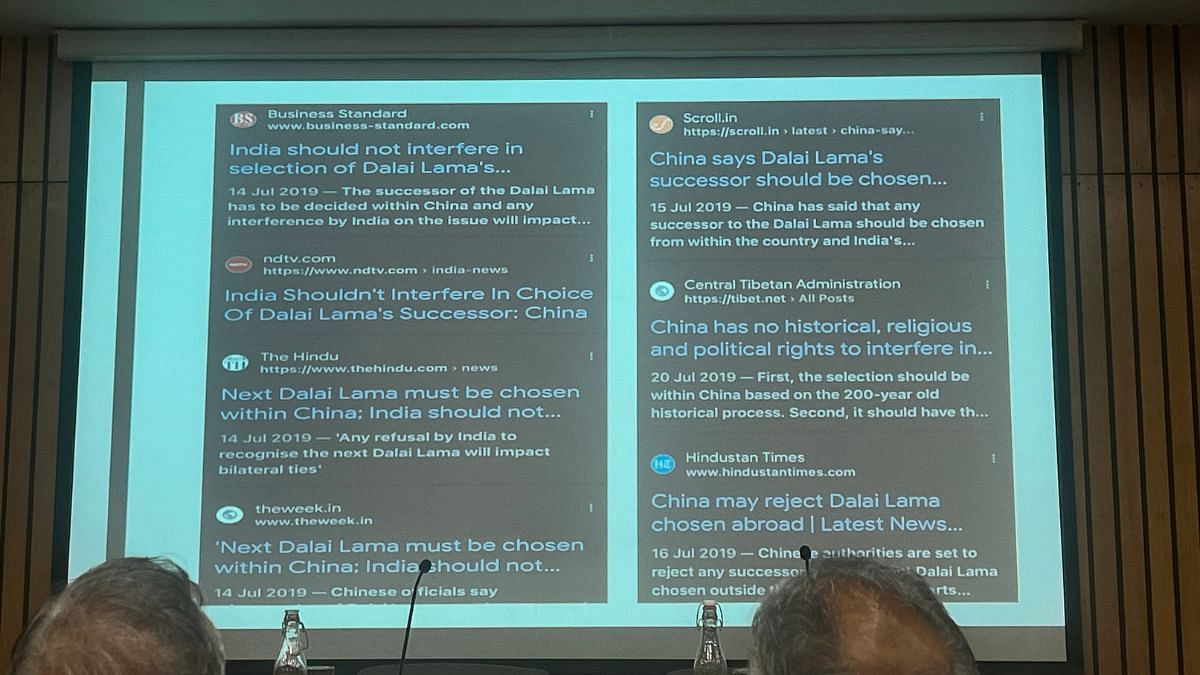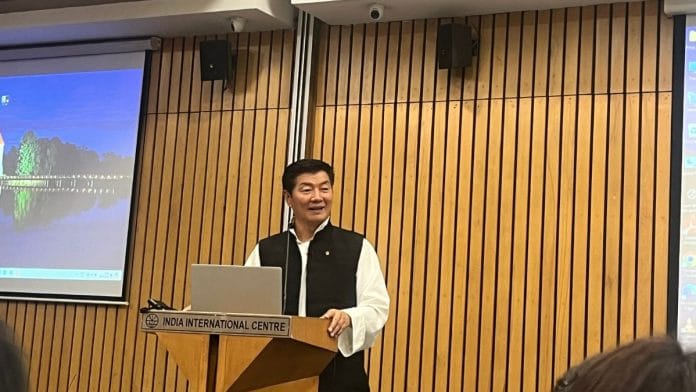New Delhi: Lobsang Sangay, former Sikyong or Prime Minister of the Tibetan government in exile, is confident in his understanding of how the United States functions. Shedding light on Tibet’s relations with the US, Sangay, currently a Harvard Law School professor, described the ties as ‘a roller coaster experience’, while mentioning the US’ ‘ping-pong’ diplomacy and Richard Nixon’s attempt to normalise his country’s relationship with China in order to counter the Soviet Union.
Sangay made the comments during a lecture on ‘Geopolitics of Reincarnation’ at New Delhi’s India International Centre on 20 June in front of a full house of nearly 100 people. In the 90-minute session, the 56-year-old spoke on themes of geopolitics and international diplomacy alongside Buddhist concepts of reincarnation, karma, and compassion.
Realpolitik and spirituality might seem completely antithetical, but the two topics are interconnected for Sangay. Political acumen and spiritual wisdom intertwined to explain the evolving nature of the Chinese occupation of the Tibetan plateau, including the thorny issue of China’s position on the reincarnation of the Dalai Lama.
The talk didn’t happen in isolation. A day before, a bipartisan seven-member US delegation, which included former US House Speaker Nancy Pelosi, had visited the Dalai Lama in Dharamshala, Himachal Pradesh. It was followed by their announcement that the US would not allow China to interfere in the succession of the Dalai Lama. Sangay intended to remind the audience about the Dalai Lama’s statement on reincarnation from 2011, where, among several other things, he had categorically stated that the next Dalai Lama wouldn’t be born in China if the issue of Tibet was not resolved. He did it by highlighting the subsequent “disinformation strategy” of the Chinese government “to manipulate and control the narrative.”
The professor said the geopolitics of reincarnation affects huge geography, naming areas where Tibetan Buddhism is practised—regions along the Himalayas, inner and outer Mongolia, among other places. Continuing his argument, Sangay also mentioned China, East Asia, and Southeast Asian countries where Buddhism is a dominant religion.
“And you might be surprised to know that the third largest religion in Italy—the land of the Catholic Church and Pope—is Buddhism. In all of Europe as well. So Buddhism has become a major religion all over the world. But directly impacting this. So, the reincarnation of His Holiness Dalai Lama has major geopolitical significance,” he said.
An atheistic party interfering in reincarnation
Sangay, who served as the Sikyong from 2011 to 2021, cited numerous instances of the workings of the Chinese government’s “disruptive propaganda machine.” To an audience comprising several journalists, he stated that the Indian media had fallen prey to Chinese propaganda in the past. Sangay recalled that in 2019, a team of Indian journalists went on a “guided tour” to China. Before the trip, he had warned a journalist not to “get fooled” by the Chinese.
“They came back on July 11th or 12th. And all the headlines, in all the major newspapers of India, were this—‘India should not interfere in the selection of Dalai Lama. China will select,’” he said, pointing to a slide showing headlines of several news articles.

While pinpointing the media’s shortcomings, Sangay also underscored and appreciated India’s role in the Tibetan freedom movement.
“No one has done more for Tibetans than India. India has done the most. Indian people have been the most hospitable. The fact that we are here, we have a government-in-exile here,” he said.
He also discussed the Chinese government’s ongoing efforts to assert control over the reincarnation process of Tibetan Lamas, including the Dalai Lama. Sangay pointed out the historical and political manipulations involved, referencing the “Golden Urn” method used by the Qing Dynasty to legitimise the selection of reincarnations of Tibetan lamas. The Chinese government still insists on using this method.
“Communist Party of China, which says religion is poison, is now issuing certificates to legitimise Lamas,” he remarked, highlighting the irony in the Chinese government’s stance.
Sangay also brought to focus a 70,000-character petition, dated 18 May 1962, written by the 10th Panchen Lama and addressed to the Chinese government. In the report, Panchen Lama wrote about the destruction of monasteries and nunneries in Tibet.
“After all this destruction, what legitimacy does the Chinese government have to say – we have destroyed everything but we have the right to choose your Lama?” the professor said.
Also read:
Reincarnation, karma, and compassion
Balancing geopolitics and the spiritual, Sangay consistently mentioned the deeply rooted Tibetan Buddhist concepts of reincarnation, karma, and compassion throughout his lecture. He went through the Dalai Lama’s 2011 statement on reincarnation, succinctly explaining all the states of the process. He also briefed on the emanation and selection process of the next Dalai Lama, which involves divination.
Though the reincarnation process might seem “complicated” to others, Sangay said it isn’t so for Tibetans.
“For 800 years, we’ve been practising this, we have nailed it. So we know how it works. It’s a well-oiled system that we have,” he said.
During the Q&A session, when tough remarks surfaced about the US’ history of “abandoning” Tibet in the past, Sangay’s reply had a latent Buddhist approach.
“We know how America functions. Generally, we know how realpolitik is, right? In international relations, everybody works for their own national interests. So when their national interests coincide with ours, we welcome them. When it doesn’t, we are compassionate,” he said, underscoring the importance of allies.
Another question was whether Pelosi’s provocative remark in Dharmshala, where she had said that the Dalai Lama’s legacy would continue and Xi Jinping’s would be forgotten, could be read as an endorsement by the Indian government.
As a seasoned speaker, Sangay skirted a direct reply but gave a response steeped in Buddhist teachings.
“Leader Nancy Pelosi is right. His (Dalai Lama’s) legacy will live on, and Xi Jinping will die, and no one will remember. All the dictators will die. It’s a historical fact that in the 20th century, eight empires collapsed,” he said, beginning his argument. Eight empires will come in the 21st century, and they will all collapse too, he added.
“So as Buddhists, we believe in impermanence. We just have to wait and survive. And our turn will come. That’s the law of karma.”
(Edited by Aamaan Alam Khan)






